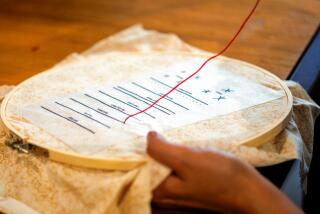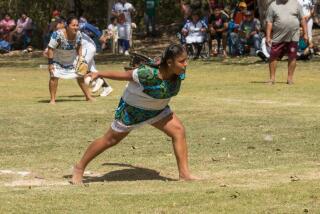A Patchwork Quilt of Aid
- Share via
Pat McCully’s Huntington Beach home has been taken over by her relief efforts to help the poor in the impoverished village of Jinotega in northern Nicaragua.
Her life has been taken over too.
Barely a week after tropical storm Mitch caused mudslides and flooding in the region earlier this month, McCully’s kitchen and living room overflowed with boxes of medicine, bedding and other supplies to be shipped to disaster victims. Donated sleeping bags and tarps spilled onto the front porch.
The telephone has been ringing continuously.
To callers eager to help, McCully explains that many Jinotega villagers, whose houses were washed away in the rains, need money for the materials to rebuild.
Even before the hurricane hit, McCully worried that Circulo de Amigas (Spanish for Circle of Friends), the program she launched 15 years ago, had become too big for her to handle.
“I’m not sure how I’ll do it all,” said McCully, 69. The retired Spanish teacher with arthritis and silver hair admits that her health “isn’t that great.”
“It wears me out at times,” she said. “People are calling; the phones and e-mail are going. There’s a group that wants to send stuffed animals to the children. I’ll have to tell them to ship it themselves.”
The Circle of Friends Foundation began when McCully set up a few sewing machines in a small Jinotega home. The idea was to teach local women a money-earning skill. The effort has grown into a multiple services center that boasts a small health clinic. The foundation to help Jinotegans also supports a preschool and an aid program for students to attend local elementary and high schools.
The circle keeps widening, in part because every time McCully sees a need, she tries to fill it.
“This is a good way to spend my retirement,” she said. “I just can’t stand to see poverty. We have so much, and they live so poorly.”
McCully says the Nicaraguan villagers live in shacks with dirt floors and mud slab or cement block walls. There is no plumbing, heating or toilets. They cook over wood fires.
When they can, men work in construction or as sharecroppers on coffee plantations for 50 cents to $1 a day. Women work as domestics.
Where food, safe drinking water, health care--all of life’s necessities--are difficult to come by, the hurricane has made everything worse.
In several trips to Nicaragua, McCully had fallen in love with the country. Still, when she first visited Jinotega in 1983, she was shocked at the living conditions. Nevertheless, it was less dangerous than some poor villages in the throes of the revolution. McCully wanted to set up a sewing cooperative in some small village, and this seemed the place.
*
Serendipitously, McCully had met Jinotegan Haydee Gonzalez at a women’s center in Mata Galpa, a city halfway between Managua and Jinotega. Gonzalez knew how to sew, so McCully recruited her to help with sewing lessons. Gonzalez is now the center director.
McCully returned year after year, twice making the trip through Central America by pickup truck so she could transport sewing machines and supplies to start the sewing classroom. She stayed in Jinotega several months at a time to give lessons to local women.
“I only know the basics of sewing, but it was the only way I could think of to help,” McCully said. “It’s not enough to just give them supplies.”
She wanted the women to survive on their own by sewing clothes, quilts and other items to sell to their neighbors. The concept is working. About 80 women have graduated from the program since she started it in 1983.
“One woman makes coverlets by sewing together squares of material; then she sells them. The women can make money by mending or altering our used clothing,” McCully said.
Back in Orange County, McCully keeps busy collecting unwanted sewing machines that she ships to Nicaragua. Program graduates can buy a machine for about $6. McCully could give them away, but, she says, she wants the women to know the pride of being business owners instead of feeling like recipients of charity. Sixty machines have been sold, with a waiting list of 20.
In 1993, McCully bought a house in the village for $7,000, adding a concrete floor and second level so Circulo de Amigas could have a permanent center. Later that year, she started a health clinic that provides prenatal care, family planning information and children’s vaccinations.
Nicaragua’s national health organization supplies some of the medicine, but the clinic pays for most supplies, including antibiotics for infections, and employs a part-time doctor for $200 a month.
Thanks to Amigas, the local preschool has two full-time teachers, a concrete floor and modest supplies.
McCully said that, as a former teacher, she was particularly upset that so many children in the village didn’t attend school because their parents couldn’t afford to pay the small stipend or buy their supplies and uniforms. Even those who are able to do so send only their boys to school.
McCully set up a student-aid program that supports 52 children, most of them girls. Sponsors pay $20 a month for a child to attend school; sponsors get photos and profiles of each student they support.
*
Ana Celia, 16, is one beneficiary. At 13, the girl had never been to school. She caught McCully’s eye because she was always looking at books. The teenager is in the fourth grade.
“Her mother signed her request [to receive aid] with an X,” McCully said. “Now Ana signs her name in full. That’s how you know you’re breaking the cycle.”
McCully attributes her success in finding sponsors and donors for Amigas because she’s given a face to the poor.
Amigas board member Dorothy Callison said: “She’s so involved herself it makes others think, ‘What am I doing sitting here in the United States enjoying this comfortable life?’ ” Added the Fullerton resident: “She’s just working on it so hard. She keeps seeing more needs in this poor little barrio.”
McCully shows slides of villagers to church and community groups throughout Orange County. She sends to about 600 regular supporters an annual newsletter of conditions in Jinotega and at the center.
Running Amigas costs about $15,000 a year but survives on donations of all kinds, including bags of fabric for the seamstresses and toys for the preschool. McCully recently collected half a dozen computer monitors that sat on her couch before being shipped to the high school, which already has about 20 used computers because of Amigas.
Recently, McCully was honored for her humanitarian work by Witness for Peace, an international nonprofit organization that coordinates human-rights delegations to Central America and the Caribbean.
“Pat has started a real participatory model that’s empowering to the community,” said Michele Weber, a Brea resident and director of Witness for Peace, Southwest in Los Angeles. “She knows she won’t be around forever and that when she’s gone, what she has done won’t be erased. She’s passing on skills so people can help themselves.”
McCully visits Jinotega once a year. She expects to return in February, the start of the school year there, to deliver school supplies and oversee the center.
She hopes that the women of Jinotega one day will start a factory and put their collective sewing skills to use. Meanwhile, she’s trying to make Circulo de Amigas as self-sufficient as possible.
McCully appointed Gonzalez to direct the center and teach sewing classes. Gonzalez’s 17-year-old niece, Maribel Torrez, the first child in the village who learned to sew, also helps.
“She became my shadow,” McCully recalled.
Maribel has stayed with McCully, once for an entire year. Thanks to McCully’s influence and support, Maribel has learned English and computer skills, attends high school and hopes to attend college.
McCully taught Spanish in Orange County for 20 years. She retired in 1987 from Huntington Beach’s now closed Gisler Middle School. She’s always liked a challenge, as proven by pictures of her riding a camel in the Sinai desert and windsurfing, a sport she still enjoys.
A divorced mother of six, McCully has gotten help for the foundation from her adult children. She’s also received help from fellow members of the Unitarian Universalist Church in Costa Mesa.
Still, she has not found a successor to run the student-aid program and carry on building the network of supporters in this country.
“I’m always looking for someone to jump in and really work with me. I’m not getting younger,” McCully said. “I never dreamed I’d be doing this 15 years later, but it’s grown.”
Circulo de Amigas needs donations of used sewing machines and cash for disaster victims. Call (714) 962-6136.
More to Read
Sign up for Essential California
The most important California stories and recommendations in your inbox every morning.
You may occasionally receive promotional content from the Los Angeles Times.













